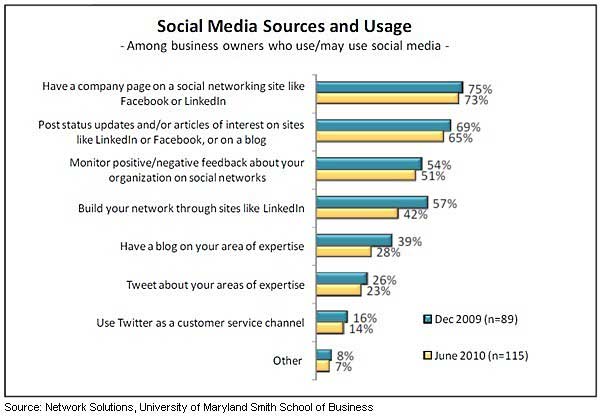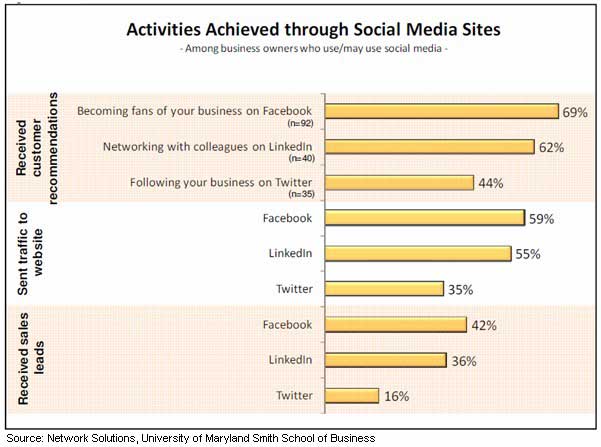As small businesses continue to navigate the economic recession, their adoption of innovative marketing technologies such as social media has leveled off, while expectations among those who use social media have changed, according to a study by Network Solutions and the University of Maryland's Smith School of Business. Still, among those that leverage social channels, 57% expect to generate a profit from their social media efforts over the next year.
The recession has taken its toll on small business (companies with fewer than 100 employees): Only 37% of surveyed small business owners say they are successful coming up with new ideas to grow their businesses, compared with 47% who said so six months earlier.
Competing against larger players has also become more challenging: Only 37% of small business owners say they are successful positioning their organizations as having the same capabilities as larger competitors, compared with 43% who said so six months earlier.
Meanwhile, companies are holding back their marketing spending: 20% of small businesses are using online advertising in 2010, down from 25% six months earlier, while 20% are using search engine optimization (SEO), down from 26%.
But websites are still a priority: 67% of small businesses have or are likely to have a website in two years. Among those that use social media, 30% plan to increase investment in their website because of social media, and another 60% don't plan to change their website investment in the next year.
Below, other findings from the fourth wave of the Small Business Success Index (SBSI) co-sponsored by Network Solutions and the Center for Excellence in Service at the University of Maryland’s Robert H Smith School of Business.
Small Biz Social Media Adoption Flat
The wave of social media adoption has tapered off: 24% of small businesses now use social media, the same level recorded six months earlier. Among them, 82% use Facebook, 38% use LinkedIn, and 30% use Twitter.
But expectations for social media marketing have changed. Small businesses are now more focused on building awareness and customer relationships via social channels, citing the following goals for social media marketing:
- Building brand awareness: 77% (vs. 56% in December 2009)
- Attracting new business: 71% (vs. 73%)
- Staying in touch with customers: 62% (vs. 46%)
Among small business owners who use social media, 73% have a company page (down from 75% six months earlier), 65% post status updates (down from 69%), and 51% monitor comments made about their businesses on social sites (down from 54%).

The use of LinkedIn has dropped: 42% of small business owners say they cultivate a business network via the social site, compared with 57% who said so six months earlier. Blogging and the use of Twitter have also dropped slightly.
Nearly two-thirds of small business owners (65%) say social media helps them stay in touch with customers, up significantly from the 46% who said so six months earlier. Similarly, 64% say social media has raised brand awareness, up from 52%.

Over one-half of small business owners (53%) say social media helps them identify new business opportunities, down from the 61% who said so six months earlier.
Looking for real, hard data that can help you match social media tools and tactics to your marketing goals? The State of Social Media Marketing, a 240-page original research report from MarketingProfs, gives you the inside scoop on how 5,140 marketing pros are using social media to create winning campaigns, measure ROI, and reach audiences in new and exciting ways.
Achievements via Social Media Sites
Small business owners say they are receiving direct sales leads from their social media efforts: 42% have received leads via Facebook, 36% via LinkedIn, and 16% via Twitter.

The top social media sites are also credited most with providing customer recommendations to small businesses via Facebook fans (69%), Twitter followers (44%), and LinkedIn colleagues (62%).
To a slightly lesser extent, FaceBook (59%), LinkedIn (55%), and Twitter (35%) also send traffic to small businesses.
Social Media Pay-off
Thus far, reviews on mixed on social media ROI: 51% of small businesses say they are breaking even, with about an equal number making a profit (22%) or losing money (20%) on their investments. Those levels are unchanged from the previous six months.
But small businesses are more optimistic about their investments in social media for the next 12 months: 57% expect to generate a profit from their efforts, 29% expect to break even, and only 8% expect to lose money.
Problems With Social Media
More than four in 10 small business owners (43%) say social media takes more time to manage than expected, compared with 50% who said so a year earlier. Some 29% say social media offers a forum for people to criticize their business publicly, compared with 17% who expressed that concern a year earlier.
Highly Competitive Small Businesses
Roughly 18% of small businesses are now rated "highly competitive"—receiving an 85 or higher (out of 100) SBSI* score—compared with 24% of small businesses six months earlier.
Among key success factors, highly competitive businesses are marketing innovators, and they use technology as a source to generate leads, build brand awareness, and develop new ideas:
- 72% of such companies expect to make a profit from using social media.
- 39% say Internet technology is important to their business.
- 26% use online advertising, compared with 18% of all small businesses.
*The SBSI is based on 281 measures, composed of six sub-indices: capital access (33%), marketing and innovation (23%), such as identifying new prospects, showing effective corporate positioning, converting leads, finding ways to efficiently advertise, and the ability to come up with new ideas, workforce (14%), customer service (11%), computer technology (11%), and compliance (8%).
About the data: The survey of 500 small US business owners was conducted by Network Solutions and the University of Maryland's Smith School of Business in June 2010. Small businesses included were privately owned, for-profits with fewer than 100 employees, and had a payroll or contributed to at least 50% of the owner's household income.



